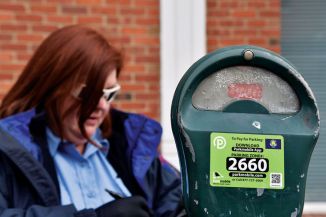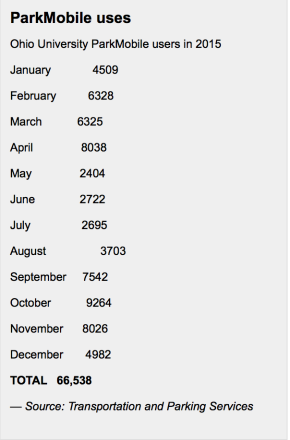Students eyes are glued to their phones, unable to escape the constant beeping and buzzing. With the need to keep connected, stalkers use that fact to their advantage when textually harassing their prey.
Widely known as “textual harassment,” it’s same kind of behavior that’s been happening offline for hundreds of years, Michelle Ferrier, associate dean for innovation at the Scripps College of Communication, said. As the behavior evolves with technology, it’s becoming difficult for law enforcement to track down the perpetrators, Ferrier added.
“Whether it’s on Yik Yak or whether it’s on other types of college platforms, let the police know and let others know that the activity is happening,” Ferrier said.
In 2005, Ferrier received racist hate mail through email and physical letters while she was a columnist at Daytona Beach News-Journal in Florida. A decade later, Ferrier joined the fight against cyber stalking when she launched her website, TrollBusters.
That website provides a support system for individuals being cyber stalked, as well as a way to track the “trolls” doing the stalking.
“There are going to be people who can brush that off and go on with their lives,” Ferrier said. “There are others who cannot.”
Sometimes, the alleged stalker can’t recognize the signals that somebody is not interested and continues to persist with texts and other forms of telecommunication, she added.
“When does it cross the line into being criminal, I think is an issue we continue to wrestle with,” Ferrier said.
Ferrier added that the person who feels attacked should be “very forthright” in letting the other person know that a line has be crossed, and that they don’t want to be communicated with anymore.
“If the activity persists after that, it becomes stalking,” Ferrier said. “In that case, the individual should immediately go to the police and report the activity.”
Law enforcement steps in
Context of the communication matters in an investigation, Athens Police Chief Tom Pyle said.
“If it goes toward the crime of stalking or harassment … all of it can be used,” Pyle said. “It’s more evidence to prove a crime.”
Stalking is one of the charges that can elevate depending on the circumstances, Pyle said. It can range from a fourth-degree felony to a fifth-degree felony. The maximum penalty could land the alleged stalker behind bars for six to 18 months and a $5,000 fine.
Those cases are directly referred to Molly Burchfield, Athens Police Department’s social worker, Pyle said.
The trickiest thing when investigating a telecommunication harassment case is figuring out which agency’s jurisdiction the crime is taking place under and making a report there, Burchfield said.
If the communication is coming from Cincinnati and the individual being harassed is in Athens, charges can be drawn up in either place, she added.
Regardless of where the communication is coming from, it’s best if the alleged stalker has been put on notice, Burchfield said.
“You can start by texting them back and saying, ‘Cease and desist, stop contacting me,’ ” Burchfield said.
If the situation involves excessive texting without any threats or a history of abuse, an officer can still make contact with them and inform them to stop contacting the other individual.
“If they don’t, then we’re definitely looking at telecommunication harassment,” Burchfield said.
The Ohio University Police Department handled 14 cases of telecommunication harassment in 2015, according to OUPD records.
University Involvement
Last academic year, an OU student was suspended after sending texts allegedly harassing a female student, according to a previous Post report.
That student sued the university in response to the suspension. The student’s attorneys said OU’s sexual misconduct policy violates free speech, according to a previous Post report.
If an OU student is being harassed over social media, the Office of Equity and Civil Rights Compliance office encourages students report harassment to the department and/or law enforcement, Jessica Cook, assistant director of Civil Rights Compliance, said in an email.
“If the reporting party perceives that the behavior in question may also be criminal in nature, we encourage individual to contact the Ohio University Police Department or the Athens Police Department to file a police report,” Cook said.
Cook added that if the social media harassment is unwelcome and sexual in nature, the behavior could be in violation of OU’s policy regarding sexual misconduct, relationship violence and stalking.
“Students may elect to strengthen their privacy settings on social media, but that is an individual choice depending upon the circumstances,” Cook said in an email.
@Fair3Julia




 Martin Paulins, director of Transportation and Parking Services, said the ParkMobile system goes down occasionally.
Martin Paulins, director of Transportation and Parking Services, said the ParkMobile system goes down occasionally.


